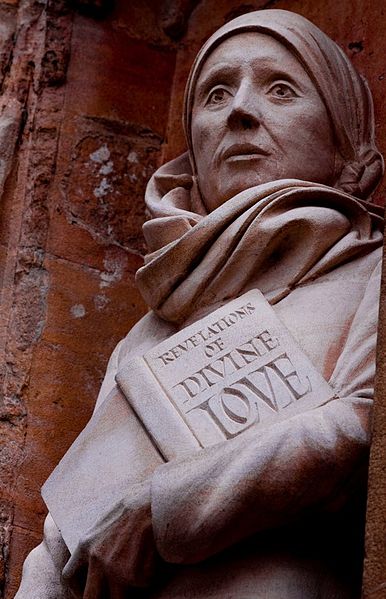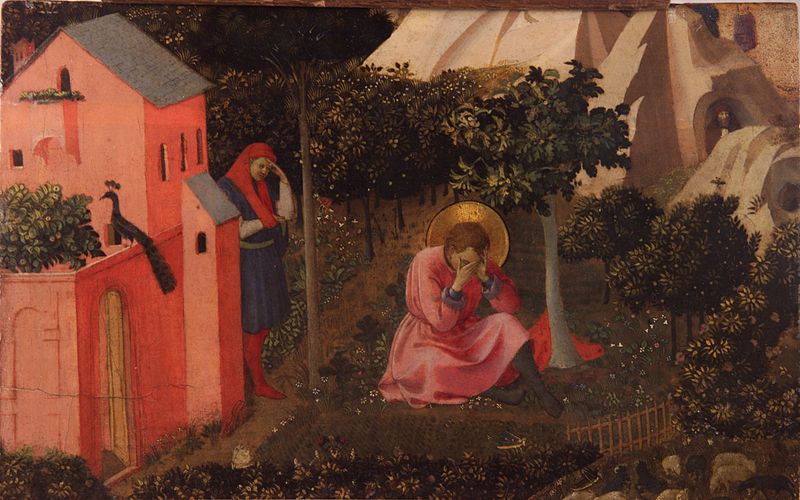(前編を読む)
神のロマンス
[toggle]The Romance of God[/toggle]ロマンティックな愛も、神への望みを描写する聖書的なたとえだ。
[toggle]Romantic love is another biblical metaphor that pictures this desire. [/toggle]雅歌は、男性と女性の間のロマンティックな愛の喜びを描いているという、そもそもの意味が現代では取り戻された。しかし何世紀にもわたって教会は、ロマンティックな愛を、神とその民の間のものとして理解してきた。たとえば、クレルヴォーのベルナルドゥスは、この聖書箇所からこのテーマのみを雄弁に語った説教集を著している。
[toggle]In our age, we have recovered the original meaning of the Song of Solomon as a celebration of romantic love between a man and a woman. But for centuries, the church has also rightly understood romantic love as a symbol of the love between God and his people—for example, Bernard of Clairvaux published 86 sermons on this biblical book, waxing eloquent on just this theme. [/toggle]
ニッコロ・ディ・ピエトロ・ジェリーニ「聖ベルナルドゥス」(米国テキサス州オースティンのブラントン美術館蔵)
ベルナルドゥスは誠実かつ聖書的にそう解釈した。もしかすると、いちばん有名なたとえは、使徒パウロの婚姻関係における愛を、神と私たちの間にある愛とした議論だろう。聖書にあるように、「それゆえ、人は父と母を離れてその妻と結ばれ、二人は一体となる」(エフェソ5:31)。
[toggle]Bernard came by this interpretation honestly and biblically. Perhaps the most well-known use of the metaphor is found in the apostle Paul’s discussion of marital love, saying that it pictures the love between God and us:As the Scriptures say, “A man leaves his father and mother and is joined to his wife, and the two are united into one.” This is a great mystery, but it is an illustration of the way Christ and the church are one. (Eph. 5:31–32) [/toggle]
このたとえは他の箇所にもある。
[toggle]And he uses the metaphor elsewhere, as well: “For I am jealous for you with the jealousy of God himself. I promised you as a pure bride to one husband—Christ” (2 Cor. 11:2). [/toggle]あなたがたに対して、神が抱いておられる熱い思いをわたしも抱いています。なぜなら、わたしはあなたがたを純潔な処女として一人の夫と婚約させた、つまりキリストに献げたからです。(2コリント11:2)
パウロはこのたとえを、神を新郎に、スラエルの民を新婦として描いた旧約聖書から引用している。預言者イザヤはこう語る。
[toggle]Paul came by this metaphor honestly as well, drawing on the many Old Testament passages that pictured Israel as the bridegroom and God as the bride. Take, for example, this from the prophet Isaiah: [/toggle][toggle]For your Creator will be your husband;あなたの造り主があなたの夫となられる。
その御名は万軍の主。
あなたを贖う方、イスラエルの聖なる神
全地の神と呼ばれる方。
捨てられて、苦悩する妻を呼ぶように
主はあなたを呼ばれる。
若いときの妻を見放せようかと
あなたの神は言われる。(54:5~6)
the Lord of Heaven’s Armies is his name!
He is your Redeemer, the Holy One of Israel,
the God of all the earth.
For the Lord has called you back from your grief—
as though you were a young wife abandoned by her husband,” says your God (54:5-6). [/toggle]
このたとえで最も有名で拡大適用された例はホセア書にある。
[toggle]Perhaps the most famous and extended use of the metaphor comes from Hosea:わたしは、あなたととこしえの契りを結ぶ。
わたしは、あなたと契りを結び
正義と公平を与え、慈しみ憐れむ。
わたしはあなたとまことの契りを結ぶ。
あなたは主を知るようになる。(2:21~22)
I will make you my wife forever,
showing you righteousness and justice,
unfailing love and compassion.
I will be faithful to you and make you mine,
and you will finally know me as the Lord (2:19–20). [/toggle]
イエスは、天の御国における私たちと神の関係を描くため、たとえ話で結婚のイメージを用いた。「天の国は、ある王が王子のために婚宴を催したのに似ている」(マタイ22:2)
[toggle]Jesus often used wedding imagery in his parables to picture our relationship with God in the kingdom of heaven. “The Kingdom of Heaven can be illustrated by the story of a king who prepared a great wedding feast for his son…” (Matt. 22:2). [/toggle]そして、食べ物のたとえと同じく、このたとえも、聖書の最後の、すべての終わりのビジョンにまで用いられている。
[toggle]And as with the nourishment metaphor, this is carried through to the end of the Bible, in the vision of the culmination of all things:ハレルヤ、
全能者であり、
わたしたちの神である主が王となられた。
わたしたちは喜び、大いに喜び、
神の栄光をたたえよう。
小羊の婚礼の日が来て、
花嫁は用意を整えた。
花嫁は、輝く清い麻の衣を着せられた。
この麻の衣とは、
聖なる者たちの正しい行いである。(黙示録19:6~8)
“Praise the Lord!
For the Lord our God, the Almighty, reigns.
Let us be glad and rejoice,
and let us give honor to him.
For the time has come for the wedding feast of the Lamb,
and his bride has prepared herself.
She has been given the finest of pure white linen to wear.”
For the fine linen represents the good deeds of God’s holy people. (Rev. 19:6–8) [/toggle]
他の教会文書の著者と同じように、ベルナルドゥスが雅歌の注解をする時、このたとえを用いるのも不思議ではない。第3説教で、「どうかあの方が、その口のくちづけをもって、わたしにくちづけしてくださるように」(1:2)という箇所の意味を説明するため、こう言った。
[toggle]It is no wonder then, that Bernard, among other church writers, exploits this metaphor as he opens his sermonic Commentary on the Song of Songs. In sermon 3, in explaining the meaning of “Let him kiss me with the kiss of his mouth,” he says: [/toggle][toggle]… anyone who has received this mystical kiss from the mouth of Christ at least once, seeks again that intimate experience, and eagerly looks for its frequent renewal. I think that nobody can grasp what it is except the one who receives it. For it is “a hidden manna,” and only he who eats it still hungers for more. [/toggle]誰でも、キリストの口から一度でもこの不思議な口づけを受けたなら、その親密な関係を求めて、積極的に何度もしたいと願うことだろう。これは、受けたことのある人にしか理解できないことだと思う。これは『隠されたマナ』であって、それを食べたことのある人だけが、それを求めて飢え渇くのである。
(ここで食べ物のたとえも用いられていることに注目)
[toggle] (Note how he also employs the nourishment metaphor as well.) [/toggle]要するに神への望みは、恋に落ちるのとよく似ている。恋に夢中になっている者は、最愛の人と一緒にいること以外は何も望まない。それは、若い恋人同士が持つ肉体的な情熱のようなものだ。そしてそれは、性的なつながりによってもたらされる快楽と同じで、瞬間的に深い満足感を与えるが、すぐにその快楽をもう一度知りたいという気持ちが大きくなる。
[toggle]In short, the desire for God is not unlike falling in love, in which the love-struck desire nothing else but to be with the beloved. It’s like the physical passion young lovers feel for one another. And it’s like the ecstasy of sexual union that momentarily satisfies ever so deeply but before long grows into a desire to know ecstasy again. [/toggle]初代福音派
[toggle]Proto-Evangelicals[/toggle]ベルナルドゥスは、私たちと神との間の個人的で親密かつ情熱的な関係を強調した初代福音派の一人だ。論文「神を愛するとは」(On Loving God)でこう書いている。
[toggle]Bernard is one of many proto-evangelicals in his emphasis on the personal, intimate, and passionate relationship we can have with God. As he put it in his treatise On Loving God: [/toggle][toggle]He is all that I need, all that I long for. My God and my help, I will love Thee for Thy great goodness; not so much as I might, surely, but as much as I can. I cannot love Thee as Thou deservest to be loved, for I cannot love Thee more than my own feebleness permits. I will love Thee more when Thou deemest me worthy to receive greater capacity for loving; yet never so perfectly as Thou hast deserved of me. [/toggle]神こそ、私が求める、私に必要なすべて。私の神、私の助けよ。私はその善良さゆえにあなたを愛する。そうしたいと私が願うほどは愛せなくても、私のできる限りを尽くして。あなたにふさわしい愛で愛することは、私にはできない。なぜなら、自分の弱さがそれを阻(はば)むから。あなたが私を、その偉大な愛を受け入れるにふさわしいと思ってくださるなら、私はあなたをもっと愛するだろう。しかし、あなたが私にふさわしいと言えるほど、私は完璧ではない。

ブレーズ・パスカル
生ける神と出会うとは、二つの現実と同時に出会うことだ。哲学者で数学者のブレーズ・パスカルほど、このことについて雄弁に語った人はいない。心奪われるようなビジョンをたどたどしくも書きとめたものが「メモリアル」(覚書)として今日でも知られている。
[toggle]To encounter the living God is to meet with two realities at the same time. The first was expressed no more eloquently than by the philosopher and mathematician Blaise Pascal, when he haltingly transcribed in what became known as his Memorial, his stunning vision: [/toggle][toggle]The year of grace 1654,恵みの年1654年、
11月23日月曜日……。夜の10時半ごろから夜中の12時半ごろまで。火
アブラハムの神、イサクの神、ヤコブの神
哲学者の神でも、学者の神でもない。
確信。確信。直感。喜び。平和。
イエス・キリストの神。
私の神、あなたの神
あなたの神は私の神になる。
神以外のことは、この世もそのすべても忘れてしまう。
Monday, 23 November, … from about half past ten at night until about half past midnight,
FIRE.
GOD of Abraham, GOD of Isaac, GOD of Jacob
not of the philosophers and of the learned.
Certitude. Certitude. Feeling. Joy. Peace.
GOD of Jesus Christ.
My God and your God.
Your GOD will be my God.
Forgetfulness of the world and of everything, except GOD. [/toggle]
多くの聖徒がこの現実を経験してきた。直接ではなくとも、圧倒されるようなビジョンで、二度と忘れられないような出会いを通して。彼らにはもう忘れることなどできないのだ。生きる神との出会いの後に続くのは、もっと強い願望だからだ。C・S・ルイスは著書『喜びのおとずれ』でそのような経験について語っている。
[toggle]Many a saint has experienced this reality, if not in a direct, overwhelming vision, certainly in some encounter that they can never shake. They can never shake it because of the second reality that accompanies an encounter with the living God—its insatiableness. In Surprised by Joy, C. S. Lewis talked about such an experience: [/toggle][toggle]It is difficult to find words strong enough for the sensation which came over me. … It was a sensation, of course, of desire; but desire for what? … An unsatisfied desire which is itself more desirable than any other satisfaction. I call it Joy, which is here a technical term and must be sharply distinguished both from Happiness and Pleasure. Joy (in my sense) has indeed one characteristic, and one only, in common with them; the fact that anyone who has experienced it will want it again. [/toggle]私に訪れた感覚を言い表すにふさわしい強い表現を探すのは難しい。あれはセンセーショナルで、もちろんそれは願望なのだが、だが何の願望なのか。他のどんなものでも満たすことのできないその願望。私はそれを喜びと言うこともできる。幸福と幸せとは違うと、はっきりとさせた上で。(私の感覚上の)喜びとは、特殊な性質を持っていて、唯一であり、共通しているところもあるが、これを経験した人は誰でも、もっと欲しいと思うのだ。
キリスト教会内では、「神を知ることは平安をもたらす」という重大な間違いが伝えられている。赦(ゆる)しと人生の目的を知ることにおいては、確かにそうだと言えるかもしれない。しかし、深い感覚の中で、神との出会いは、満足感をもたらすばかりか、同時に不満足感ももたらすのだ。充実感だけでなく、もっと欲しいという思いを。そして、もっと欲しいという気持ちは、決して満たされることがない。
[toggle]The cardinal mistake in some Christian circles is telling people that knowing God will bring us peace. Yes, in the sense of knowing forgiveness and purpose in life. But in a deeper sense, an encounter with God brings us not only satisfaction but also deep dissatisfaction, not just fulfillment but also longing, and a longing that can never be fulfilled. [/toggle]
ノリッジ大聖堂のノリッジのジュリアン像(写真:rocketjohn)
ノリッジのジュリアンは『神の愛の啓示』(Revelations of Divine Love)でこの感覚を「耐えがたい望み」とした。「神が恵み深くもそのお姿を少しでも見せてくださるのなら、私たちは同じ恵みで、もっとすべてを見たいという望みに突き動かされるのです」。いちばんうまく言い表しているのは、「私は彼を見て、彼を求めた。彼を得て、彼を欲した」という一文だろう。
[toggle]In her Revelations of Divine Love, Julian of Norwich called it “an unbearable desire.” She wrote, “If he graciously lets us see something of himself, then we are moved by the same grace to seek with a great longing to see him more fully.” She put it best when she said: “I saw him and I sought him, I had him and I wanted him.” [/toggle]私たちは、他の欲望のように一瞬ではなく、無限のものを欲している。そして、その望みが少しでもかなえられると、私たちは神の美しさや不思議さ、そして愛がどれほどであるかに気づく。私たちがその不思議さと栄光に飽きることは決してない。だから、これこそ私たちの渇望する最も貴重なものなのだ。
[toggle]We are longing for the infinite, for that which all other desires only point. And when our desires are fulfilled, however briefly, we recognize how much more there is in God’s beauty and wonder and love. We can never exhaust its wonder and glory—and for that very reason, it is the most precious of longings. [/toggle]繰り返すが、私のような者は、「そのような渇望は、少数の霊的な人にしか与えられていない」と言いたくなる。そういう人には特殊な神への願望があるが、私たちの多くは、しっかりとした現実的なことを望む。特別な情熱は、食べ物や飲み物、ロマンスや愛、素晴らしい音楽やアート、創造のすばらしさの中にいたいということに注がれる。人それぞれの望みに。この霊的な情熱は全員にあるのではないと私は思う。
[toggle]Again, a person like me is tempted to say that longing is given only to a few naturally spiritual people. They have a unique desire for God, but most of us desire concrete realities and have special passions for, perhaps, food and drink, or romance and love, or fine music or fine art, or to be in the splendor of creation, and so forth. To each his own. This spiritual passion isn’t for everybody, I think. [/toggle]しかしイエスは、私たちが皆、神の愛を追い求め、それを最大限に追求するようにと命じられていると語る。この命令は、他の命令のように「するべき」というものではなく、「こうしなさい。そうすれば生きる。本当に生きる」と言っているのだ。
[toggle]And yet, Jesus says it is, in that he commands that we all pursue the love of God, and pursue it the fullest extent. This, like all commands, is not as much a “should” as it is a promise: Do this, and you shall live. Really live. [/toggle]落ち着きのない私たちは、自分の欲求に従ってあちこち飛び回り、何かを見つけられるのではないかという希望を持って、この退屈から救い出してくれる、この望みを満たすものを探している。私たちが追い求めるものは、経済的な安定、愛、天職につくこと、趣味や娯楽の喜び、意味のある仕事だ。しかしそれらは、より本物の、より良い、より美しいものを指し示しているにすぎない。私たちは本物の影を追っているだけなので、結局、落ち着きのないままでいることになる。
[toggle]In our restlessness, we flit from one thing to another as we follow our desires, hoping against hope to find something, anything that will cure our boredom and satisfy our longings. Everything we pursue—financial security, love, fulfillment in a calling, the joy of a hobby or pastime, meaning work, and so forth—are mere pointers to something more true, more good, and more beautiful. We remain restless precisely because we mistake these shadows for the real thing. [/toggle]
フラ・アンジェリコ「聖アウグスティヌスの回心」
最悪の場合、私たちは2番目に欲しいと願うものを偶像にしてしまう。そうでなかったにしても、道に迷った旅人が通過点に来ただけなのに、目的地に着いたと勘違いしているようなものだ。いずれにせよ、何かもっと良いものが私たちを待っている。アウグスティヌスは『告白』で、自身が若かったころを思い出してこう語っている。「私は喜びや高貴さ、真実を、神のお造りになられたもの、つまり私や他の人に求めてしまい、神ご自身からは求めなかった。だから、悲しみと混乱と誤りに陥った。神に感謝します。私の喜びと栄光と希望である神、あなたの賜物に感謝します」
[toggle]At our worst, we make idols out of the penultimate things we desire. At our most innocent, we are like confused travelers who rejoice in reaching a milestone, mistaking it for our destination. In either case, there is something better that awaits us. The great Augustine, in reflecting on his youth in Confessions, said, “I sought pleasure, nobility, and truth not in God but in the things he had created, myself and others. Thus I fell into sorrow and confusion and error. Thanks be to Thee, my Joy and my Glory and my Hope and my God: Thanks be to Thee for thy gifts.” [/toggle]アウグスティヌス研究者であるマイケル・フォーリーは、この箇所がアウグスティヌスの望みの神学を物語っているという。「肉体的な喜びの欲望は、最終的には、神にある幸福のためのうめきである。だから、創造主でなく被造物で満足しようとすれば、喜びではなく悲しみで終わる」。同じことが、高貴でいることや真実への憧れにも言える。
[toggle]In commenting on this, Augustine scholar Michael Foley noted that this passage outlines Augustine’s theology of desire: “The appetite for physical pleasure is ultimately a groaning for happiness in God, and thus the attempt to satisfy it with created goods instead of the Creator ends in sorrow rather than joy.” The same applies to the yearning for nobility and truth. [/toggle]だから言ってみれば、「神に夢中」でない人などいない。たった一つの問題は、何を望んでいるのか、その望みが私たちをどこへ導くのかに気づいているか、いないかだ。アウグスティヌスが簡潔にまとめたように、「私たちの心は神の中で安息を見つけるまでは落ち着かない」のだ。
[toggle]Thus there is no one who is not “into God,” so to speak. The only thing at issue is whether we are aware of what our desires are for and where they are designed to lead us. As Augustine famously and succinctly put it, “Our hearts are restless until they find their rest in thee.” [/toggle]神を求める。これが人生の要だ。たくさんある命令のうちの一つではなく、いちばん大切な命令なのだ。これは、やり遂げなくてはいけない任務ではなく、人生そのものを充実させるもの。心を尽くし、魂を尽くし、思いを尽くし、力を尽くして、あなたの神である主を愛する。これを追求し、私たちの内で生まれる永遠の憧れを楽しむこと以上に素晴らしい恵みなどない。ウェストミンスター小教理問答における「人間の目的とは何か」という問いの答え、「神の栄光を現し、永遠に神を喜ぶこと」ということだ。
[toggle]To desire God—this is the sum and substance of life. It’s not just one injunction of many but the greatest commandment. It’s not merely a duty to fulfill but the fulfillment of life itself—to love God with all our heart, all our soul, all our mind, and all our strength. There is no greater blessing than to give oneself to this pursuit, and to enjoy the everlasting longing it produces in us. This is what the Westminster Catechism is getting at when it says that the chief purpose of men and women is “To glorify God, and enjoy him forever.” [/toggle]だから、別に詩編の著者は、神経が高ぶり、感情的になりすぎていたのではない。健全な人間なのだ。もしこれが心の病気というなら、皆で分かち合うべきだ。教会は罪人のための病院であり、神を執拗に愛する聖徒のための保護施設でもある。私たちには、神を追い求めること以外、何もいらない。この追求には終わりがないことはよく分かっている。そして、人生においてこれ以上に良いものなどないことも。「私は彼を見て、彼を求めた。彼を得て、彼を欲した」からだ。
[toggle]So the psalmist is not neurotic or an emotional wreck, but the sanest of human creatures. If it is a mental illness, then let us all share in it. The church is not only a hospital for sinners but also an asylum for those disturbed saints who are monomaniacs for God, who want nothing but to seek after him, knowing full well that the pursuit will never end, and yet knowing too that there is nothing better to do with one’s life—“I saw him and I sought him, I had him and I wanted him.” [/toggle]執筆者のマーク・ガリは「クリスチャニティ-・トゥデイ」の編集長
本記事は「クリスチャニティー・トゥデイ」(米国)より翻訳、転載しました。翻訳にあたって、多少の省略をしています。
出典URL:https://www.christianitytoday.com/ct/2019/june/monomaniacs-for-god.html
